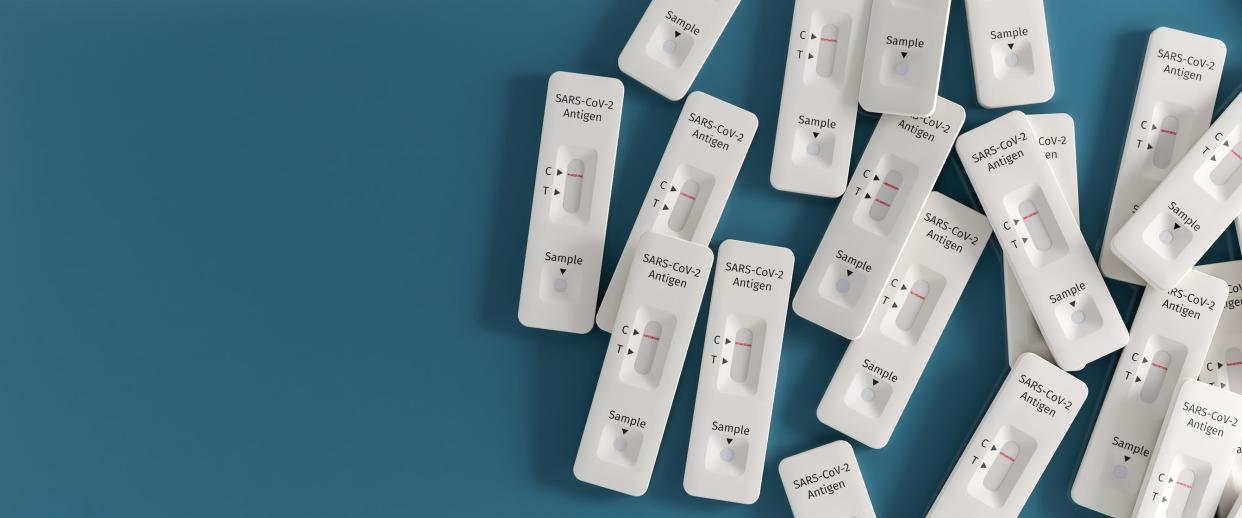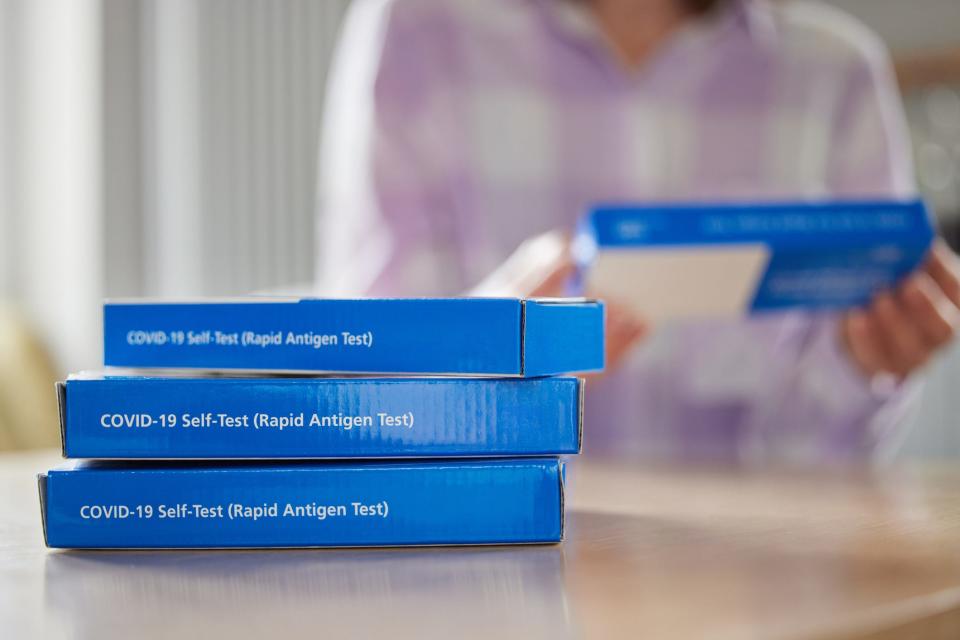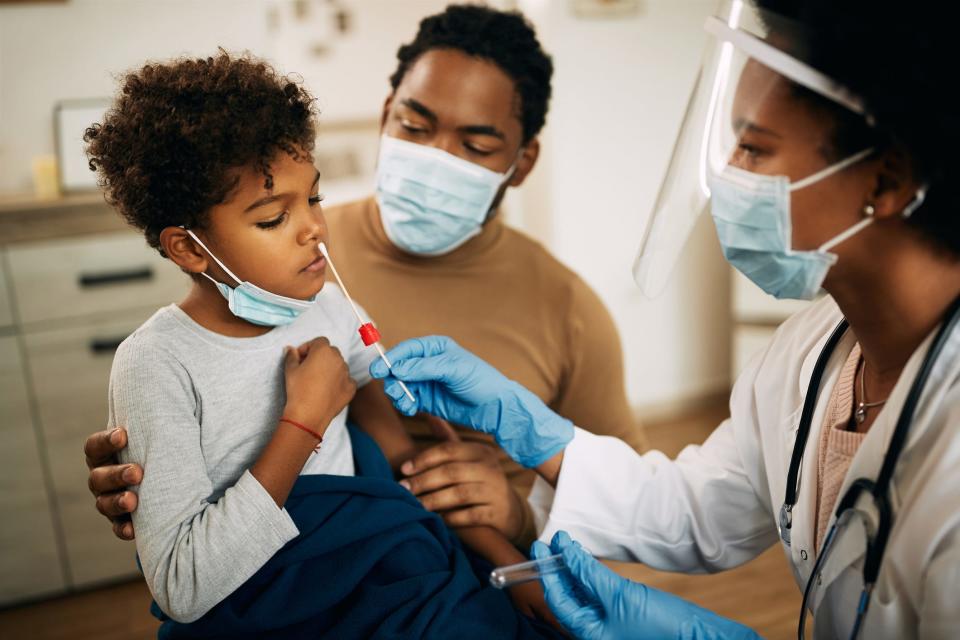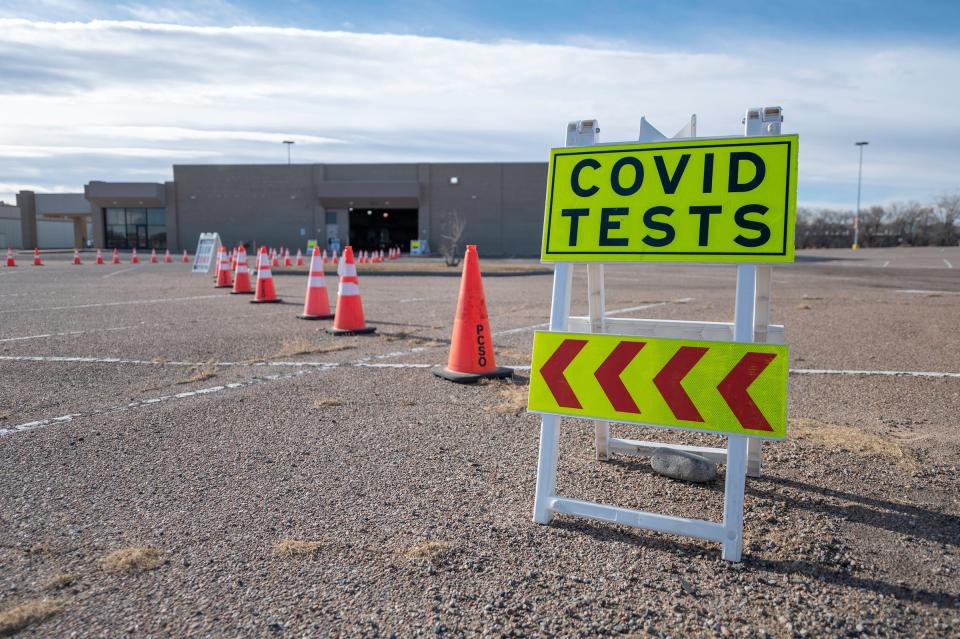How and where to get COVID tests before the holidays as cases of JN.1 variant surge

- Oops!Something went wrong.Please try again later.
The holidays are well underway and people are looking forward to or already enjoying time with friends and family, some of whom have likely traveled a distance to attend the festivities (and brought some germs with them.)
Unfortunately, holiday cheer isn't the only thing on the rise this season. The Centers for Disease Control (CDC) has said that COVID cases are likewise climbing through December, thanks in part to the fastest spreading new variant, JN.1.
Now the second-largest source of COVID cases, JN.1 is highly contagious and prone to spreading rapidly, which isn't great news during a time when many are planning to host large gatherings.
Worried about keeping your family safe? Besides vaccination, proper hygiene and precautions like wearing masks, testing is an important component to stopping the spread and keeping our more vulnerable loved ones infection-free.
Wondering where to get tested in advance of Christmas? We know sticking that cotton swab up your nose isn't the most fun activity to celebrate the holidays, but we can make things a bit easier when seeking out a test in the first place.
Buying at-home tests
Tests are available for purchase at most pharmacies, including CVS, Walgreens and Rite Aid, and many grocery stores such as Walmart. You can also order some online via Amazon, brick-and-mortar retailers with online shops and in some cases from the manufacturer's website itself.
Unfortunately, insurance companies are no longer required to pay for COVID testing, which was once covered to the tune of eight take-home tests a month. Research from independent organization KFF found that at-home tests generally cost between $12 and $24 per pack, averaging in at $11 per test.
While this may not seem a huge cost to some, it adds up quickly if you have to test often or are simply on a tight budget. However, it is often the quickest way to obtain a test on short notice or to stock up if you like to keep a few around the house.
It's important to keep in mind that at-home tests are rapid antigen and not PCR tests, which are generally considered the most accurate. According to the Centers for Disease Control and Prevention, at-home antigen tests take only minutes and are accurate and reliable when reporting positive results.
However, PCR tests are more likely to detect the virus even when the patient is exhibiting no symptoms. Because of this, the FDA recommends two negative antigen tests for individuals with symptoms or 3 antigen tests for those without symptoms, performed 48 hours apart. Only a single PCR test is required by comparison.
COVID variant JN.1 on the rise: Current symptoms to look out for
Finding at-home tests for free

In November, the government launched another round of free COVID tests for U.S. households. If your household has not yet claimed yours through this program, you are entitled to four free at-home tests delivered directly to your home. If you did not receive the round made available in September either, you can place two orders and get up to eight tests.
To order online, visit COVIDtests.gov and fill out the form which asks for your full name and mailing address. The tests will then be shipped free via USPS to the provided location, including P.O. boxes. You will receive an order number and updates via email if you choose to input your email address.
While insurance providers are no longer required to cover COVID-19 tests, many still do. Contact your provider to find an in-network pharmacy where you can get a certain number of tests either covered on the spot or reimbursed. Medicare beneficiaries are likewise still eligible for free tests.
Testing sites and other community resources like libraries, food banks, schools and charities in your area may also have free at-home tests on offer.
Finding testing sites

There are thousands of free testing sites still in operation around the country. These community-based resources offer antigen or PCR testing to every American, regardless of insurance status.
The Increasing Community Access to Testing (ICATT) program run by the federal government continues to function, providing no-cost COVID-19 testing for people who are symptomatic or were exposed via an estimated 19,000 sites across the U.S.
Using the CDC No-Cost COVID-19 Testing Locator, you can simply enter your address or zip code, select a 5 to 100-mile radius in which to search and instantly receive a list of results.
Uninsured people and people who rely on Medicare, Medicaid, VA insurance, or who receive care from Indian Health Services can also receive free access to COVID-19 and flu testing, telehealth, and treatment through the Home Test to Treat program.
It's the flu season, too: How to not get yourself or others sick over the holidays
Other ways to get tested

If you have a primary care physician or another doctor you regularly work with, you may contact them or pay them a visit for testing that is more likely to be covered by insurance. Urgent care and ER facilities likewise will test you in an urgent or emergency situation.
People with disabilities can also contact the Disability Information and Access Line for help accessing a test or finding a test location.
There are likewise online services designed to help you find a one-off appointment for testing or offer other related telehealth care. Many insurance providers have some form of telehealth but the internet likewise has an abundance of options such as Zocdoc.
COVID this holiday season
The many gatherings that happen around the holiday season can pose an increased risk for transmission, meaning testing is a good idea even if you don't have symptoms before attending an event, gathering, or visiting an at-risk individual.
If you're concerned about COVID around your loved ones this holiday season, the CDC suggests a few precautions, including:
Test as close to the time of the event as possible (at least within 1-2 days).
If you use an antigen test, follow recommendations for repeat testing to be confident in a negative result.
Additionally, you may want to find a free testing location or visit your doctor for a PCR test before visiting people with a higher risk for severe illness.
Consider practicing social distancing or wearing masks during large gatherings, while traveling, or during other high-transmission events where at-risk people may be.
Keep up to date on your COVID vaccines and boosters. Get your flu and RSV shots if you're able to as well.
Get vaccines at least two weeks before holiday travel or gatherings.
Keep up with handwashing and good hygiene practices.
Stay home if you are infected or have symptoms of illness.
If you have symptoms, test immediately.
If you are only going to take a single test, a PCR test will provide a more reliable negative test result.
If you use an antigen test, a positive result is reliable, but a negative test is not always accurate.
If your antigen test is negative, take another antigen test after 48 hours or take a PCR test as soon as you can.
If you do not have symptoms but have been exposed to COVID-19, wait at least 5 full days after your exposure before taking a test.
If you are only going to take a single test, a PCR test will provide a more reliable negative test result.
If you use an antigen test, a positive result is reliable, but a negative test is not always accurate.
If your antigen test is negative, take another antigen test after 48 hours or take a PCR test as soon as you can.
If your second antigen test is also negative, wait another 48 hours and test a third time.
This article originally appeared on USA TODAY: How to get free, cheap COVID test kits for holidays as JN.1 surges

